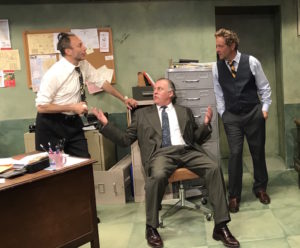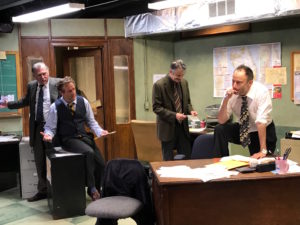Arts Week
A Sign of the Times: Glengarry Glen Ross at the Harbor Stage Company
The play that won David Mamet a Pulitzer when it debuted in 1984, Glengarry Glen Ross concerns a group of middle-aged Chicago salesmen—definitely men—hustling tracts of worthless Florida real estate dressed up as real investments with Scottish-sounding names like Glengarry Highlands and Glen Ross Farms. They’re hustling their clients, they’re hustling each other, and by the end of the play one finds oneself wishing that the thief who absconded with the precious “leads” would take the whole office with him as well. There’s nothing to like about these characters or their interactions; but that’s not Mamet’s point: the play is all about deceptions—the deceptions we practice on others, the deceptions we practice on ourselves. It’s an interesting juxtaposition of the glorification of salesmanship with the toll that it takes on people as, well, people.
 Mamet’s been called “a poet of bluster and flimflam, the bard of the blighted American male,” and there is indeed something of poetry in the rapid-fire, talk-over-each-other dialogue in Harbor Stage Company’s current production. Unusually, only one of the founding members is onstage—Robert Kropf, who also directed the piece, plays the smarmy Ricky Roma—but he’s given excellent backup by the other actors, all of whom rise to the stellar performance level that audiences have come to expect from Harbor Stage.
Mamet’s been called “a poet of bluster and flimflam, the bard of the blighted American male,” and there is indeed something of poetry in the rapid-fire, talk-over-each-other dialogue in Harbor Stage Company’s current production. Unusually, only one of the founding members is onstage—Robert Kropf, who also directed the piece, plays the smarmy Ricky Roma—but he’s given excellent backup by the other actors, all of whom rise to the stellar performance level that audiences have come to expect from Harbor Stage.
Be warned: you’re not going to like any of these characters. Mamet would be disappointed if you did. The only nice people around stay stubbornly offstage and become the butt of jokes. And Mamet’s obscene and scatological language could be off-putting for some (though for no one in the audience on the night I went, where every utterance of “fuck”—and they were myriad—elicited gales of laughter). But beyond that, this is a play about loneliness, about looking back and trying to grasp a glory that, perhaps, never was there in the first place.
Mamet’s characters look even more like small-time losers in 2017 when weighed against the culture of corporate criminality and pitiless downsizing that has blossomed since they were created. The set design—their low-rent office, the tackiness of the Chinese restaurant they frequent—just underlines the sense that they are all on their way out: the end, not just of them, but of an era.
 Mamet’s technique takes some getting used to. He fractures language, starting with sentences that become shorter and shorter, then devolve into fragments, sometimes even just words, before being interrupted by another speaker’s fragment. That style gives the dialogue a rapid-fire intensity and requires actors’ timing to be impeccable—and it is. William Zielinski’s Shelley Levene is pathetic, pitiful, and annoying, just what you’d expect from a salesman past his prime. He yells, he whines, he begs, and he reeks of failure. Zielinski puts a certain manic energy into the role that assures audiences that here is one guy who’s going to go home and put a gun in his mouth if he ever really believes that he’s finished; but his tragedy is that he never will believe that. Kropf—who is consistently inspired across roles—brings just enough positivity to Roma that his is the character one could like, at least a little. He’s at the top of the board, about to win the Cadillac, but he takes time to listen to Levene’s tale (the telling of which takes forever because of constant interruptions). Everybody is at an almost manic level of energy.
Mamet’s technique takes some getting used to. He fractures language, starting with sentences that become shorter and shorter, then devolve into fragments, sometimes even just words, before being interrupted by another speaker’s fragment. That style gives the dialogue a rapid-fire intensity and requires actors’ timing to be impeccable—and it is. William Zielinski’s Shelley Levene is pathetic, pitiful, and annoying, just what you’d expect from a salesman past his prime. He yells, he whines, he begs, and he reeks of failure. Zielinski puts a certain manic energy into the role that assures audiences that here is one guy who’s going to go home and put a gun in his mouth if he ever really believes that he’s finished; but his tragedy is that he never will believe that. Kropf—who is consistently inspired across roles—brings just enough positivity to Roma that his is the character one could like, at least a little. He’s at the top of the board, about to win the Cadillac, but he takes time to listen to Levene’s tale (the telling of which takes forever because of constant interruptions). Everybody is at an almost manic level of energy.
Mamet’s script is filled with racism and misogyny, emblematic of the ’80s; but it would be a mistake to view this as a purely historic commentary. These days, the smarmy real estate hustlers have made their way into the presidential administration in Washington, with obvious and inevitable consequences. Indeed, it’s not a stretch to imagine Steve Bannon, Jared Kushner et. al. screaming obscenities at each other as yet another deal falls through and the police start staking out space in their offices. And that’s perhaps the ultimate sadness of Glengarry Glen Ross: that we’ve come to live it in real life and on an international stage.
Photos: Joe Kenehan












